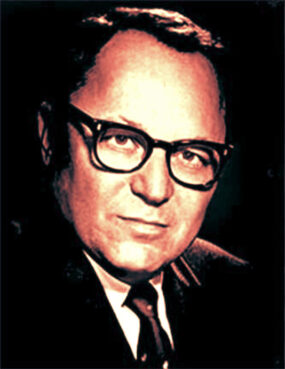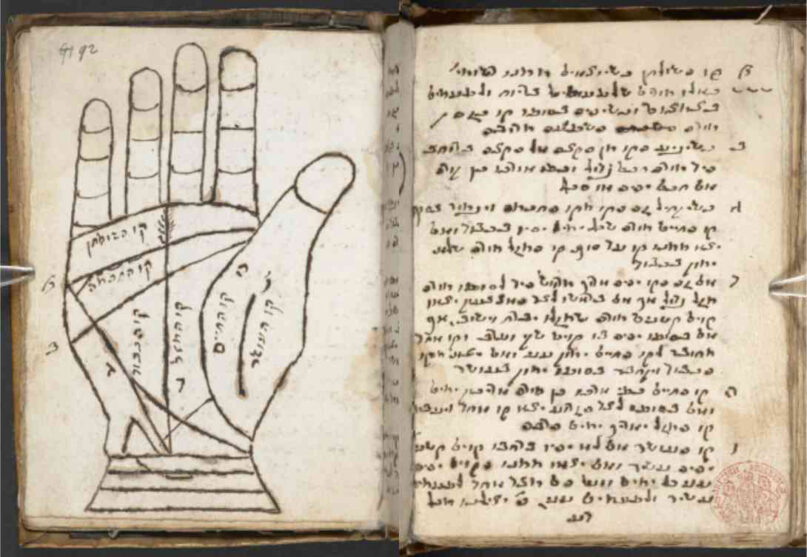(RNS) — There is a wonderful quip in the Talmud: “Ever since the destruction of the Temple in Jerusalem, prophecy has been taken from prophets, and given to fools and children.”
Well, not entirely.
Consider the late Rabbi Arthur Hertzberg, one of American Judaism’s most erudite leaders. He was one of my role models — a man who combined being a congregational rabbi with being an intellectual leader and a communal activist.
Someone once said of him: “Arthur was frequently wrong, but he was never in doubt.”
That is why I smiled when I discovered an old issue of Reform Judaism magazine (of blessed memory). It was from fall 2002. It contained an interview with Rabbi Hertzberg, in which he made a series of predictions: “2025: The Next Generation.”
Rabbi Hertzberg’s words remind us that making predictions about the Jews, as about anything, will only be partially successful — if that.
Let’s revisit his words — and smile — and sometimes grimace.
What will the American Jewish community look like in 2025?
“It will reflect American society as a whole — an amalgam of innumerable interweaving cultures and worldviews. Just as both Jews and white Christians will be minorities in America, about twenty percent of our synagogues’ population will be more multi-ethnic.”

Rabbi Arthur Hertzberg in 1972. Photo courtesy of Wikipedia/Creative Commons
Rabbi Hertzberg was partially correct.The 2020 Pew Report reports that 96%-98% of American Jews identify as non-Hispanic white; 1%-2% as Black; less than 1% as Asian.
Rabbi Hertzberg was correct in predicting the Jewish community would be far more diverse than it has ever been. A visit to our religious school, which is an ethnic and racial Joseph’s coat, would make that clear.
My synagogue is hardly alone. Whenever I hear the tone-deaf comment: “Funny, you don’t look Jewish,” I think of a quip from the late Rabbi Rachel Cowan, herself a descendant of Mayflower passengers: “It’s funny how Jewish looks these days.”
And yet, we still have a long way to go. Recently, I was with a prominent Black Jew, and someone approached him and asked, out of curiosity, “Do you have any Jewish genes?”
To which I responded: “Do you? Prove it!”
Sheesh.
“More non-Jews will choose to convert because it is easier to raise children in homes that are united by religion.”
This has happened, but not for the reasons Rabbi Hertzberg predicted. The 2020 Pew Report shows religious intermarriage, across the board, is rising in America.
So, too, conversion rates are growing, but not necessarily for the purposes of marriage.
Mark Oppenheimer writes in Tablet:
Since most surveys of American Jews overlook converts — the latest Pew Research Center survey is no exception — in March and April we posed questions about the state of Jewish conversion to over 100 rabbis, from all denominations of Judaism, and received answers from 79. Thirty-four of them, or 43%, indicated they were doing more conversions today than earlier in their careers. And these numbers are conservative. “I can’t keep up with the traffic,” Brookline, Massachusetts, Rabbi Bill Hamilton told us. “If I had to quantify, it has tripled over the past decade,” said Shmuly Yanklowitz, an Orthodox rabbi at Valley Beit Midrash, in Phoenix, who said the big increase dates to well before COVID-19 …
Will Israel continue to play a vital role in how Jews define themselves?
“Our solidarity with Israel is the most uniting and least divisive aspect of American Jewish public life. This passion for Israel will remain deep and abiding into the next generation and beyond.”
While Rabbi Hertzberg is correct about solidarity with Israel in times of trouble, the current crisis in Israel is testing that solidarity. Rabbi Hertzberg could not have predicted — indeed, he would be tearing his clothing in mourning — the new coalition and its more xenophobic and racist elements.
He would be castigating Israeli leaders for playing footsie with American Jewish emotional loyalties to the Jewish state, and for embarking on an Israeli version of Barbara Tuchman’s “march of folly,” and he would be right to do so.
Will the Orthodox still maintain religious control in Israel in 25 years?
“Yes, I see no likelihood that Israel’s Knesset will produce the majority needed to dismantle the chief rabbinate and the extensive structure of rabbinic authority throughout the country. Too few Reform and Conservative Jews are going to make aliyah to change the status quo.”
Rabbi Hertzberg was right — sadly right.
Do you think it’s likely that a Jew could be elected president by 2025? Why or why not?
Rabbi Hertzberg cited the example of Sen. Joseph Lieberman, an observant Jew, who had been Al Gore’s vice presidential running mate in 2000. He expected a Jew could be elected president by 2025 or even sooner.
Rabbi Hertzberg was wrong. When he wrote those words in 2002, we were still several years away from America’s first nonwhite president, and we are still not discernibly closer to a female president.
No Jew has been elected president, yet.
But, even still, Rabbi Hertzberg would have been surprised and pleased to see that Bernie Sanders’ Jewish ethnic identity did not seem to be an impediment to his presidential ambitions.
Likewise, Rabbi Hertzberg would have smiled at how many Jews have served in presidential Cabinets, and who are part of the families of both presidents and vice presidents, with Doug Emhoff serving as the second gentleman.
Will there be more or fewer synagogue-affiliated Jews in 2025?
Rabbi Hertzberg expected shrinkage of about 10% or more.
We are not sure if Rabbi Hertzberg was right. Obviously, Rabbi Hertzberg could not have predicted COVID-19, with its often devastating effect on synagogue attendance. There has been a general trend in religious decline, but it is as yet unclear as to how pervasive this is in American synagogue life — at least, as regards affiliation. Anecdotal evidence abounds, however, that many non-Orthodox synagogues are shrinking and merging.
Rabbi Hertzberg predicted the American Jewish population would decrease from 4.5 million to 4 million due to assimilation and the low Jewish birthrate. Rabbi Hertzberg was wrong; it has not happened that way.
What will be the main domestic concerns of American Jews?
“Antisemitism, but less from Christians and more from Muslims.”
Rabbi Hertzberg was right, but … his perceptions were obviously shaped by the immediate aftermath of 9/11.
It turns out Muslim antisemitism has not been as lethal a factor as he had predicted. Moreover, Rabbi Hertzberg could not have predicted the rise in violent antisemitism from the extreme right wing. The attack on Tree of Life in Pittsburgh would have been unthinkable to him. So would Charlottesville.
Rabbi Hertzberg was optimistic about the Jewish future.
“Our faith that we must go on has kept our people alive for nearly four thousand years. … Think of the Jews who were tempted to give up after the destruction of the Second Temple. … We are here to tell the story. The Jewish response to adversity is to rebuild. … The story of the Jewish people will continue. We will always find the courage and, yes, the wisdom to regroup and rebuild.”
Rabbi Hertzberg’s words — 20 years later — continue to inspire me, and I hope they will inspire you, too. Our response to adversity — whether it be the adversity born of tragedy, or of sociology, or of demography — has always been the stubborn urge to rethink, reconsider and yes, to rebuild.
His voice speaks from the grave. I hope we will all pay attention.






